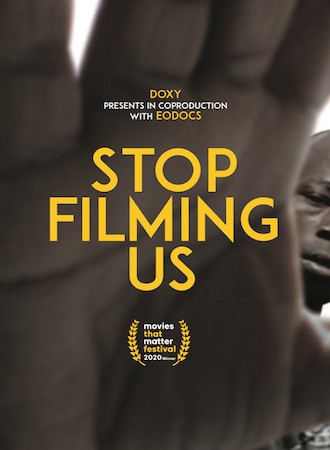
Stop Filming Us 2020
Distributed by The Video Project, 145 - 9th St., Suite 230, San Francisco, CA 94103; 800-475-2638
Produced by Sylvia Baan
Directed by Juris Postema
Streaming, 95 and 55 mins
High School - General Adult
Area Studies; Communication; Documentaries
Date Entered: 10/13/2020
Reviewed by Allen Reichert, Electronic Access Librarian, Otterbein UniversityThis is a fascinating and well-made film about the representation of the Congo in Western media, and how the Congolese navigate this representation. There is a dynamic tension to this approach. On the one hand, the director, Juris Postema, is most interested in issue of representation. He asks his hosts from Yole!Africa at different times if he should even be filming in their city of Goma. These discussions are a strong part of the film, with varied responses. He couples these discussions with interviews and with moments showing local photographers working. How he features the work of the photographer Ley Uwera is particularly valuable. The film suggests there is the work she does for herself, and then there is work that is done for Western aid agencies. This is the main aspect of the film, and it raises great questions.
There is a second film within Stop Filming Us, and this is the film that seems to be what most of the Congolese want. There are times when Postema films a more positive side of the city, to show some of the happiness and vibrancy. Most of the work by the photographer Mugubo Baritgera, who appears throughout the film, particularly highlights this aspect. Mugubo repurposes a house to make an art gallery, and the film ends with his first art show. There is also a charming short film he makes of a young boy rollerblading, with voiceover when the boy talks about his love for Goma. Indeed, often the critique for the main aspect of the film is how the Western portrayal of the Congo is always a negative one.
To the filmmaker’s credit, at the very end he includes his screening of Stop Filming Us with the members of Yole!Africa Arts Center and includes some of the questions and responses he received. Like the earlier discussions, there are a variety of opinions, but the inclusion of one commenter was valuable for the overall film and shapes audience awareness. This commenter talks about the ambivalence in the film, such as the translator Gaius having to ask permission to be in the film from the Western company he works for. The commenter goes on to say that these will be the only scenes the Western audience will remember, which is to say only the negative side of the Congo. The commenter correctly identifies a difficulty in making a film like this for an outside audience. However, by including this comment at the very end, the director aptly forces the audience to realize and reflect on the positive aspects that are included throughout the film.
There are two versions of this film. The longer version is superior, which is as it should be. However, the 55-minute version, which was remixed, does a good job and works admirably if you can only show the short version. The film can also be “clipped” to highlight certain aspects when teaching. This film would pair well with the online work of some of the featured photographers, such as Bernadette Vivuya. It would have been good if the film had captioned the photographers when they were introduced.
There is a secondary use for this film. Since Postema is so aware of his role as director, this makes the film a rich option to talk about the process of making documentaries. As with any film, some scenes must get cut and some things are left ambiguous. There is a great scene with the sound man TD Jack Muhindo and line producer Ganza Buroko when Postema says they will start filming again, but they tell him to include the scene. The self-awareness in this film leads the viewer to think about the nature of documentaries.
This is a strong film that asks interesting questions. At the same time, it is also a film that allows you to hear multiple Congolese voices and shows a positive side of Goma. Highly recommended.
Awards:utch Movies Matter Award, Movies That Matter Film Festival